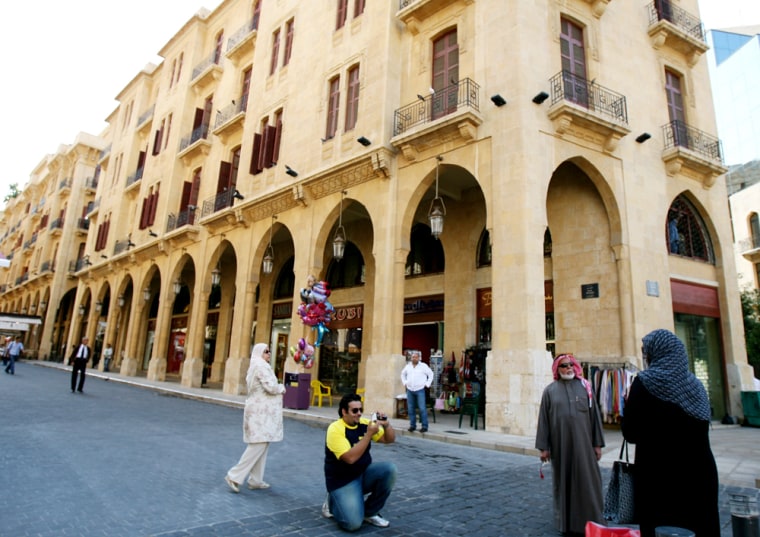Foreign tourists used to pop into Sandra Spanioli’s gift shop in a five-star Beirut hotel every few minutes to buy a magazine, a map or a postcard. Now, she’s lucky to see 20 customers a day.
Lebanon’s tourism industry was on track to break records this year before the war between Israel and Hezbollah broke out July 12 and brought business at hotels, restaurants and shops to a crashing halt.
Two months after the Aug. 14 cease-fire, few tourists are trickling into Lebanon. Industry experts say the travel business will take two years to rebound, and then only if the country remains stable and safe, an uncertain prospect.
“Business is not good right now,” said Spanioli as she stood behind the counter at The Visitor Books & Gifts. “Perhaps it could get better, but that’s only if the political situation calms down a bit.”
A small country on the Mediterranean Sea, Lebanon has no significant natural resources and relies heavily on tourism, which accounts for about 12 percent of national revenue.
The industry suffered some turbulence after the February 2005 assassination of former Prime Minister Rafik Hariri, but Lebanon enjoyed a period of relative calm after Syria withdrew its troops two months later and tourists crowded Beirut’s beaches and Baalbek’s ancient ruins.
Before the war, Tourism Minister Joe Sarkis was predicting a record 1.6 million visitors in 2006, with revenues topping $2 billion.
But the rosy outlook ended with the hostilities, replaced by more sullen forecasts. The Beirut airport was closed for more than a month after it was attacked by Israeli warplanes and gunboats. An oil spill caused by Israeli airstrikes tainted Beirut’s beaches and frescoes in a Roman-era tomb in the southern port city of Tyre were shaken to the ground.
Nada Sardouk Ghandour, the Ministry of Tourism’s general director, said the amount of lost revenue has not yet been calculated, but small- and medium-sized businesses were most affected.
“It was paradise to hell, that’s what happened,” Ghandour said. “Loss and catastrophe happened to Lebanon’s economy, including the tourism industry.”
According to Ministry of Tourism statistics, 26,684 people arrived in Lebanon in August — an 85.4 percent decrease from the same month last year. In September, the number jumped to more than 67,000 — a majority from other Arab countries — but it was still nearly 43 percent less than September 2005. October figures were not available.
Lebanon had hoped for a slight bump in visitors during last week’s Muslim holiday of Eid al-Fitr, when throngs of mostly Arab tourists usually flock to the country.
Ghandour said hotels averaged between 40 and 60 percent occupancy during the holiday. A scattering of tourists from other Arab countries could be seen dining at Beirut’s swanky restaurants, and a few tour buses could be seen on city streets.
Jihane Shkar, general manager at the Albergo Hotel in Beirut, said her 33-suite hotel was luckier than most, with 70 percent of the rooms occupied during Eid. But instead of staying for a week like they had in the past, many of her guests were in Lebanon for only three or four days, and some canceled at the last minute, she said.
Ghandour said the ministry is trying to work with banks and small tourism businesses to help them stay afloat. A program that began in the summer allowing visitors from some countries, including the United States, to enter the country without a visa will continue, and plans to promote Lebanon at international travel conferences are in the works.
She predicted that tourism will return to prewar levels by 2008 — if the country rebuilds and remains stable.
“Tourism is coming back slowly,” she said. “If there is some silence, it would help us a lot.”
But stability is not a guarantee in Lebanon, where fears of political unrest pervade. Beirut has witnessed a series of minor attacks over the past few weeks, including a grenade fired at a downtown building that houses a dance club. The explosion, which was near U.N. offices, injured six people, broke windows and damaged cars.
Many people believe the attacks had political or sectarian overtones, but no suspects have been publicly named.
The unease has some international tour operators discontinuing trips to Lebanon until the situation is safer.
Amr Abdel-Ghaffar, of the U.N. World Tourism Organization in Madrid, said that, based on past experience, he believes Lebanon can recover.
“There is a resilience to bounce back. This is our experience with tourism in not just in Lebanon but the whole Middle East,” he said.
But at the Riviera Yacht Club on the Beirut coast, which has just a scattering of diners on a recent sunny afternoon, general manager Walid Noshie wasn’t optimistic about the near future.
“I was making 40 percent more business this year, and then they started this stupid war and the businesses is bad,” he said. “We count on tourism. We count on stability. Tourism and instability don’t work together.”
